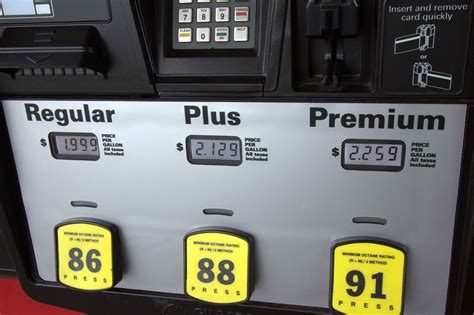Premium fuel is frequently used in high-end automobiles. That does not imply, however, that it is solely advantageous for high-end vehicles. Which car needs it the most will determine everything. One of the most frequent decisions made by car owners is whether to use normal or premium fuel. This decision, however, is frequently misinterpreted, which could lead to a waste of cash at the gas pump.
Do you truly know what you’re getting when you choose ordinary or premium petrol at the gas station? Which one is best for your car? Is premium gas always the best option for your vehicle, and is it worth the extra money?
What is premium fuel?
Premium gas is a 91-octane gasoline designed to fuel high-performance engines. Higher octane ratings indicate that the fuel is more balanced and stabilized against spontaneous combustion, which can harm an automobile engine and result in knocking. Compared to ordinary gas, premium gas could also have superior additives. Premium gas, on the other hand, may not be required or increase economy for vehicles that are built to run on ordinary gas.

There is a reason why the owner’s manual for your car advises using premium gas. Turbochargers, high-compression engines, and other high-performance features are found in vehicles that need premium gasoline. Your engine won’t necessarily suffer if you don’t use premium, but if you use normal or midgrade gas, you can lose some of the performance of the premium engine you bought.
Top advantages of using premium fuel
Enhanced Engine Performance
Premium gas can maximize engine performance in high-compression or turbo-charged engines because of its higher octane rating, which is similar to that of recreational fuel. In order for the engine to run efficiently, premium gasoline avoids pre-ignition and guarantees that combustion occurs at the proper moment. Additionally, it enhances reaction, giving your car a powerful pick when you push the gas pedal.
Improved fuel efficiency
Although this may seem like a fallacy, there are some situations in which premium petrol can genuinely increase fuel economy. Premium gas is advantageous when used in a car that can handle high-octane fuel. These vehicles have the ability to cut fuel consumption and efficiently burn higher-octane fuel. Although the increases in fuel efficiency may differ, premium petrol can assist high-end cars get the most mileage when driving on highways, hauling large loads, or stuck in traffic.

Reduced engine knock
An engine’s cylinder produces pressure and a knocking sound when fuel ignites early. We call this pre-ignition or engine knock. Engine knocking may be caused by using fuel with a lower octane than what the engine needs. It is preferable in these situations to use a higher-octane fuel, such as premium gasoline. Premium gas enables the engine to automatically modify the ignition timing and prevents pre-ignition.
Cleaner engine and reduced emissions
Additives in premium fuel keep fuel injectors and intake valves clean and stop carbon buildup. Emissions are lowered as a result of the fuel burning more effectively in the car engine. An engine that has been properly maintained and has good fuel-burning capacity produces comparatively fewer greenhouse gasses, which is good for the environment.
Longevity and maintenance of high-performance engines
It is advantageous to use premium fuel in turbocharged vehicles in order to prolong the engine’s lifespan. Premium gas with a high octane guarantees a smooth combustion process that minimizes accumulation and avoids knocking. You thereby gain from it by avoiding engine damage and avoiding costly long-term repairs.
Is it good to use premium fuel for a car that recommends regular fuel?
Because premium gasoline has an octane value of 91 or higher than ordinary gasoline’s 87, it is not a stronger fuel than regular. Engines with higher compression ratios, sophisticated ignition timing, or forced-air induction—all of which operate best when fed premium fuel—are made possible by this higher octane. But use 87-octane regular if the car maker claims that’s all your engine needs.

Since premium gas theoretically provides less energy than lower-octane fuel, its higher octane won’t make your car go faster. Premium fuel consumption for engine performance is probably psychological, and it could be brought on by favorable weather or other circumstances. If your engine frequently bangs, it’s treating the symptom rather than the root reason. A mechanic should be consulted to determine whether carbon deposits or hot spots are the source of the knock.
Debunking common myths about premium fuel
Premium fuel provides more power
Cars that aren’t built for high-octane fuel don’t get more power from premium gasoline. High-performance engines that expressly need fuel with a higher octane rating are the only ones that benefit. Therefore, if your vehicle uses standard petrol, utilizing premium won’t make a difference.
Premium fuel is always cleaner and purer
Because all fuel must adhere to stringent performance and cleanliness criteria, purity is not about premium or ordinary. Although premium gas contains more detergents to support high-performance engines, standard gas of superior quality is also devoid of contaminants, unless the source is selling subpar fuel.
Using premium fuel in regular engines is always better
It’s a common misconception that using premium gasoline in an engine that’s meant for normal fuel would always result in improved performance. If you were wondering what would happen if you mixed ordinary and premium gas, the answer is that it wouldn’t hurt your engine, but it wouldn’t boost performance either. Therefore, it is a waste of money to use premium fuel if your car is designed to run on normal petrol. Using the fuel that is suggested in your vehicle’s manual is preferable.

Even with all the advantages of premium fuel, it won’t make much of a difference if your car is designed to run on regular gas. The efficiency and performance will remain the same. You must so adhere to the owner’s manual for your vehicle. Use the fuel your automobile requires and avoid paying more for premiums if you don’t need to. Use premium only if it genuinely enhances your vehicle’s performance.




